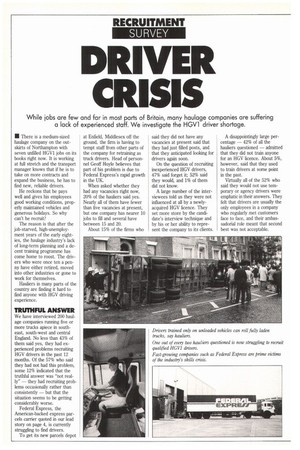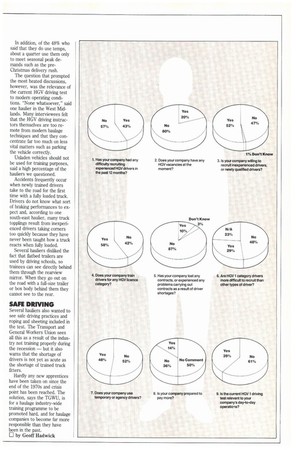DRIVER CRISIS
Page 32

Page 33

If you've noticed an error in this article please click here to report it so we can fix it.
While jobs are few and far in most parts of Britain, many haulage companies are suffering a lack of experienced staff. We investigate the HGV1 driver shortage.
• There is a medium-sized haulage company on the outskirts of Northampton with seven unfilled HGV1 jobs on its books right now. It is working at full stretch and the transport manager knows that if he is to take on more contracts and expand the business, he has to find new, reliable drivers.
He reckons that he pays well and gives his employees good working conditions, properly maintained vehicles and generous holidays. So why can't he recruit?
The reason is that after the job-starved, high-unemployment years of the early eighties, the haulage industry's lack of long-term planning and a decent training programme has come home to roost. The drivers who were once ten a penny have either retired, moved into other industries or gone to work for themselves.
Hauliers in many parts of the country are finding it hard to find anyone with HGV driving experience.
TRUTHFUL ANSWER
We have interviewed 200 haulage companies running five or more trucks apiece in southeast, south-west and central England. No less than 43% of them said yes, they had experienced problems recruiting HGV drivers in the past 12 months. Of the 57% who said they had not had this problem, some 12% indicated that the truthful answer was "not really" — they had recruiting problems occasionally rather than consistently — but that the situation seems to be getting considerably worse.
Federal Express, the American-backed express parcels carrier quoted in our lead story on page 4, is currently struggling to find drivers.
To get its new parcels depot at Enfield, Middlesex off the ground, the firm is having to tempt staff from other parts of the company for retraining as truck drivers. Head of personnel Geoff Hoyle believes that part of his problem is due to Federal Express's rapid growth in the UK.
When asked whether they had any vacancies right now, 20% of the hauliers said yes. Nearly all of them have fewer than five vacancies at present, but one company has nearer 10 jobs to fill and several have between 15 and 20.
About 15% of the firms who said they did not have any vacancies at present said that they had just filled posts, and that they anticipated looking for drivers again soon.
On the question of recruiting inexperienced HGV drivers, 47% said forget it; 52% said they would, and 1% of them did not know.
A large number of the interviewees told us they were not influenced at all by a newlyacquired HGV licence. They set more store by the candidate's interview technique and by his or her ability to represent the company to its clients. A disappointingly large percentage — 42% of all the hauliers questioned — admitted that they did not train anyone for an HGV licence. About 5%, however, said that they used to train drivers at some point in the past.
Virtually all of the 52% who said they would not use temporary or agency drivers were emphatic in their answers. They felt that drivers are usually the only employees in a company who regularly met customers face to face, and their ambassadorial role meant that second best was not acceptable. In addition, of the 48% who said that they do use temps, about a quarter use them only to meet seasonal peak demands such as the preChristmas delivery rush.
The question that prompted the most heated discussions, however, was the relevance of the current HGV driving test to modern operating conditions. "None whatsoever," said one haulier in the West Midlands. Many interviewees felt that the HGV driving instructors themselves are too remote from modern haulage techniques and that they concentrate far too much on less vital matters such as parking the vehicle correctly.
Unladen vehicles should not be used for training purposes, said a high percentage of the hauliers we questioned.
Accidents frequently occur when newly trained drivers take to the road for the first time with a fully loaded truck. Drivers do not know what sort of braking performances to expect and, according to one south-east haulier, many truck topplings result from inexperienced drivers taking corners too quickly because they have never been taught how a truck reacts when fully loaded.
Several hauliers disliked the fact that flatbed trailers are used by driving schools, so trainees can see directly behind them through the rearview mirror. When they go out on the road with a full-size trailer or box body behind them they cannot see to the rear.
SAFE DRIVING
Several hauliers also wanted to see safe driving practices and roping and sheeting included in the test. The Transport and General Workers Union sees all this as a result of the industry not training properly during the recession — but it also warns that the shortage of drivers is not yet as acute as the shortage of trained truck fitters.
Hardly any new apprentices have been taken on since the end of the 1970s and crisis point has been reached. The solution, says the TGWU, is for a haulage industry-wide training programme to be promoted hard, and for haulage companies to become far more responsible than they have been in the past. LI by Geoff Hadwick
















































































































